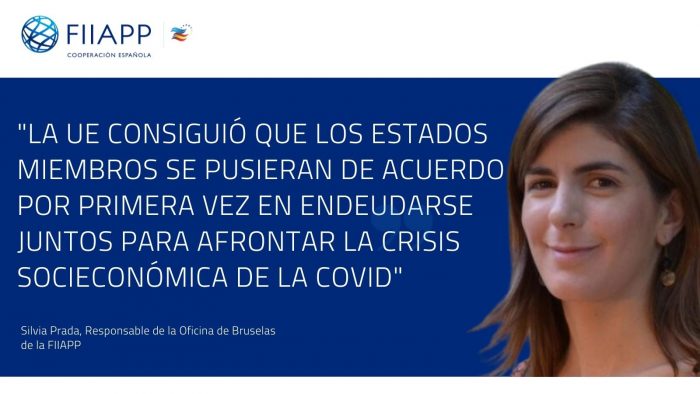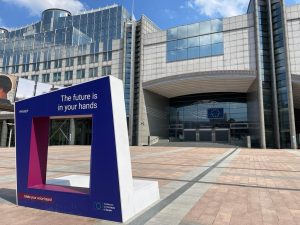-
09 May 2022
Category : Interview
Europe, united in the face of adversity
These are turbulent times for Europe and for the world. But if there is one thing we have to celebrate on 9 May, it is the unity of the European Union in the face of adversity that threatens the pillars on which European values are built. A united Europe is a strong and resilient Europe. Silvia Prada, director of the FIIAPP's Brussels office, discusses the EU's new challenges, how it is managing them and what efforts it is making to position itself geopolitically at the global level.

Question: Looking back, with everything that has happened: the COVID crisis, the war in Ukraine… How is the EU handling the current global context?
Answer: The pandemic was one of the crises that pushed European integration forward. The pandemic was the high point because the EU managed to get member states to agree for the first time to borrow together to deal with the consequences of the socio-economic crisis caused by COVID.
In the external action dimension, the birth of “Team Europe” as a joint reaction of European cooperation actors to the needs of partner countries to address the pandemic and the exit from it. In line with the objective of the current Von der Leyen Commission: “A stronger Europe in the world” in the face of such a dramatic situation as the war in Ukraine, Europe, with the sanctions against Russia, has once again shown that unity in adversity, which is what defines and distinguishes it as a project and a space for consultation and regional integration.
Q: You mention that the current Commission has given the EU a more geopolitical focus, how has this affected development cooperation?
A: It has resulted in a paradigm shift from development cooperation to international partnerships, reflecting the change in the name of the Commission service from DG Development Cooperation to DG INTPA. It responds to the need to build international partnerships to leverage resources other than public resources to implement the 2030 Agenda and achieve its development goals. I think it is an opportunity to think about how these partnerships can be more strategic and how it can be an opportunity for the EU to project what distinguishes us, which are our values. This more geopolitical outlook also raises the level of cooperation policy and brings it closer to the EU’s external action priorities. I think this can be positive, as long as we do not lose the ultimate goal for which we work with our partners, which is to improve the lives of people and the planet.
The European Commission in Brussels on Europe Day
Q: It is precisely this holistic approach that is most reflected in the Team Europe logic, how would you define it?
A: As the joining of forces that can achieve more impact than if European actors work individually and in an uncoordinated way. I think it is showing the potential of our diversity as Europeans on the international stage, how we can be stronger if we join forces both in terms of talent from our administrations and from the private sector, the banking sector, civil society.
Q: In addition to this Team Europe strategy in recent months, there have been big projects and framework strategies such as the Global Gateway, but sometimes it feels like these documents don’t reach the people on the ground, what is the real impact of these documents on day-to-day life?
A: It is a framework, like a branding exercise. It is a strategy that we are moving towards together, and the big challenge is how to make it concrete and make it a reality without losing sight of the shared priorities with our partner countries. It is the joint look at how we want to achieve more impact to address challenges that we share with the other partner countries.
Q: What are the EU’s sectoral and geographical priorities for development cooperation?
At the geographical level we see that the region where the focus is clearest is sub-Saharan Africa and the neighbourhood, but Ukraine is also drawing attention to the importance of not losing sight of Latin America, which is our neighbour in every sense except geographically.
At the sectoral level, the two big priorities are the green and digital agenda. What COVID has taught us is that a just transition is needed, that the transition cannot only be green and digital but also has to be social, and although this part is not so marked, I think it is the distinctive feature of Europe, our social model.
Q: In all the work that the FIIAPP does in Brussels, one of the key areas is the Practitioners’ Network, what does this network consist of?
The Practitioners’ Network is an informal European network that brings together most of the European cooperation agencies. It has 15 years of experience, FIIAPP has been a member of the network for 8 years and will take over the co-presidency in May. It is the platform for strategic dialogue with the European Commission. It is a key space because it is where we can share realities that we encounter on a day-to-day basis in programmes and projects, it is the place where we can highlight the most relevant lessons learned when we work together and how we can improve in this regard. It is the platform where we can, from practice, and from our ideas, nourish the agenda of European cooperation, especially at this time of reflection or challenge to achieve coordinated joint work through the spirit of Team Europe and the new European development architecture that is under building, with the challenge of making it more structured and inclusive.
Q: The FIIAPP will take over the co-presidency in May. What are the priorities you intend to promote?
A: Above all, to promote the potential of the network as a guide for the incipient European development architecture or European cooperation system, coordinated and inclusive. How the network can contribute to the construction of a stronger narrative around Team Europe, as a milestone towards the construction of a European architecture for development, and how it can help us to reflect internally as agencies. Another issue is how it will be done: what are the methodologies and lessons learned from practice that can help us to work together in a more strategic, inclusive and participatory way, with the 2030 Agenda and its 17 SDGs as a frame of reference. In that sense, to continue work that has been of great added value, such as the reflection on the potential of public talent in our Member States, for a distinctive European cooperation around our values and interests.
The views and opinions expressed in this blog are the sole responsibility of the person who write them.





